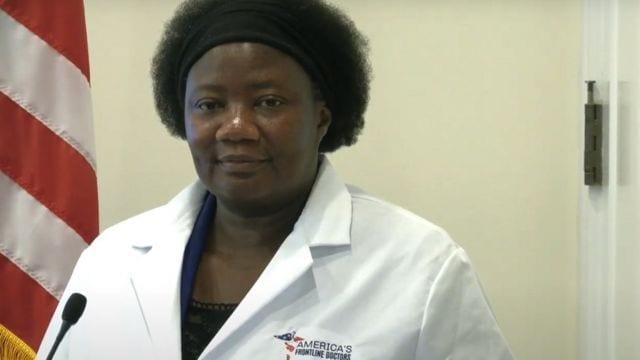The Texas Medical Board has warned physicians against “assuring a permanent cure for an incurable disease,” implicitly threatening a Houston doctor who appeared in a video this week promoting the drug hydroxychloroquine, which was retweeted by President Trump .
Dr. Stella Immanuel, a pediatrician, said in a viral video recorded on the steps of the U.S. Supreme Court, “Hello, you don’t need a mask. There is a cure.”
“Nobody needs to get sick,” Immanuel said. “This virus has a cure.” Immanuel doubled down on the claim in subsequent media appearances and in statements on social media.
The drug touted by Immanuel, hydroxychloroquine, is a common antimalarial drug. Since the outbreak of COVID-19, doctors have prescribed it in clinical settings to treat the new disease, but its efficacy is still being debated.
The Texas Medical Board neither endorses nor forbids the use of the drug, but it has statutory powers to investigate misleading or deceptive claims by doctors, as well as violations of its rules on standards of care.
In a statement Friday, the medical regulator said, “In the past week there was a widely published claim of a ‘cure’ for COVID-19. As we are all aware the medical community is still learning, researching and gaining understanding of the virus. While there are drugs and therapies being used to treat COVID-19, there is no definitive cure at this time.”
“Both patients and physicians have a right to decide what treatment may be used for COVID-19. The Board does not issue endorsements of the use of any specific drugs or treatments for COVID-19, but any treatment decision must be made with full, proper and accurate disclosure by a physician.”
The Texas Medical Board cautioned physicians that when treating patients with COVID-19 they “must provide full disclosure of treatment options, side effects, obtain informed consent, and there cannot be false, misleading or deceptive advertising or statements made regarding any therapies, including a cure for COVID-19.”
‘False, misleading or deceptive advertising… could include assuring a permanent cure for an incurable disease.’
The final paragraph of the statement reads like a warning shot over the bow of the Houston physician, Dr. Stella Immanuel: “If the Board were to receive a complaint, it would be reviewed following the Board’s standard enforcement process, and may include a standard of care review by outside third-party physician experts if the matter involves the treatment of a patient. The Board may also investigate complaints for false, misleading or deceptive advertising, which could include for assuring a permanent cure for an incurable disease.”
In an interview with a Houston television station Thursday, Dr. Immanuel was asked by a journalist about why she calls hydroxychloroquine a cure rather than a treatment.
She replied, “It is a cure. Okay, what’s a cure? …It eradicates the symptoms, it eradicates the virus. We see patients day one, we put them on hydroxycholoroquine, they come back day seven, day 10 , and they are negative. It eradicates the virus. It is a cure.”
Dr. Anthony Fauci, director of the National Institute of Allergy and Infectious Diseases, has advised against using hydroxychloroquine for the treatment of COVID-19.
“The overwhelming, prevailing clinical trials that have looked at the efficacy of hydroxychloroquine have indicated that it is not effective in coronavirus disease,” Fauci said on an ABC morning program Tuesday.
According to the FDA, the drug comes with risks of side effects, including serious heart rhythm problems, blood and lymph system disorders, kidney injuries, and liver problems and failure.
Newsweek reported that the National Institutes of Health halted a clinical trial in June after determining that hydroxychloroquine “was very unlikely to be beneficial to hospitalized patients with COVID-19.”
Dr. Immanuel was born in Cameroon and received her medical degree in Nigeria, before doing a medical residency in the United States.
President Trump on Wednesday defended his decision to share the video of Dr. Immanuel and criticized social media companies for labelling her comments misinformation and removing videos of her. The Associated Press quoted him saying, “I was very impressed by her.”
